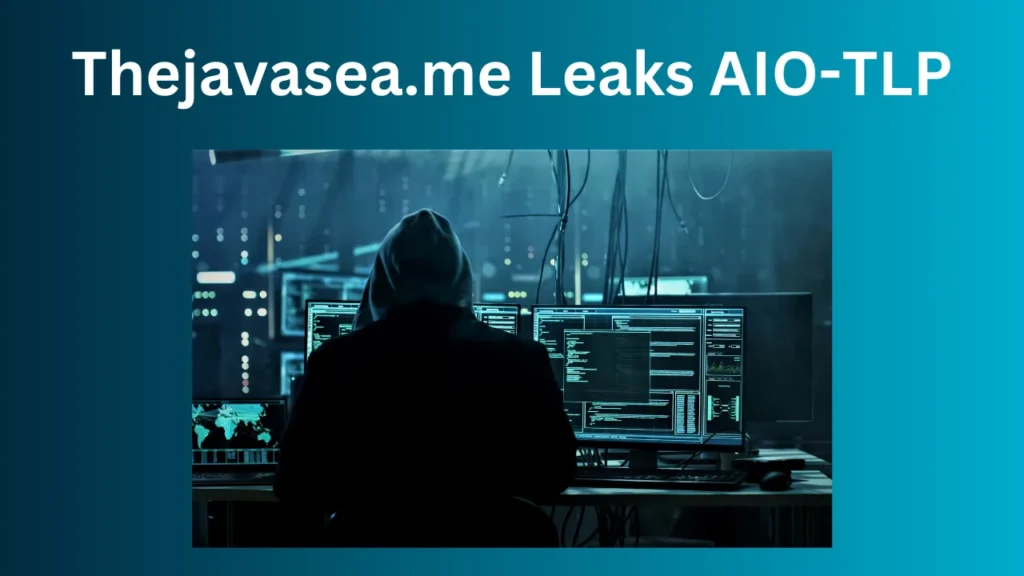thejavasea.me leaks aio-tlp142 in today’s digital landscape, data breaches and leaks have become increasingly common, raising concerns over privacy and security. One such incident that has garnered attention is the leak associated with thejavasea.me leaks aio-tlp142, specifically known as AIO-TLP142. This article delves into the details of the leaks, their implications, and the broader context of cybersecurity, aiming to provide readers with a comprehensive understanding of this incident and its significance.
Understanding thejavasea.me
thejavasea.me leaks aio-tlp142 is a website that has made its mark in the online community by offering a variety of content, including resources related to software, gaming, and other digital services. While it has attracted a dedicated user base, the site also faces scrutiny regarding its data protection measures. The recent leak raises questions about how well platforms like thejavasea.me safeguard user information, and it highlights the risks users take when sharing sensitive data online.
What is AIO-TLP142?
The term AIO-TLP142 refers to a specific dataset that has been leaked from thejavasea.me. This dataset reportedly includes a range of sensitive information, such as usernames, passwords, and possibly other personal identifiers. The exposure of such data poses significant risks, including identity theft, unauthorized access to accounts, and potential financial loss.
The Content of the Leak
The leaked data encompasses numerous user accounts, each containing vital information that, if exploited, could lead to severe consequences for individuals involved. The exposure of usernames and passwords can allow malicious actors to impersonate users, gaining access to their online activities and sensitive information. In today’s digital world, where personal and financial information is often interconnected, the ramifications of such leaks extend beyond individual users, affecting communities and organizations alike.

The Implications of the AIO-TLP142 Leak
The thejavasea.me leaks aio-tlp142 serves as a stark reminder of the vulnerabilities present in online platforms. Its implications resonate across various domains, including personal security, community trust, and the ethical responsibilities of website operators.
Personal Security Risks
One of the most immediate consequences of thejavasea.me leaks aio-tlp142 leak is the heightened risk of personal security breaches. Individuals whose information has been exposed may find themselves at risk of identity theft, phishing attacks, and unauthorized access to their online accounts. Cybercriminals often leverage leaked data to craft targeted attacks, exploiting the information for malicious purposes. Users must remain vigilant and take proactive measures to protect themselves.
Community Trust and Reputation
The incident also affects community trust in thejavasea.me and similar platforms. Users expect their information to be secure, and breaches can significantly erode that trust. Communities thrive on the confidence users have in platforms, and incidents like thejavasea.me leaks aio-tlp142 can lead to a mass exodus of users seeking safer alternatives. As the reputation of thejavasea.me takes a hit, it must address security vulnerabilities and regain user trust to remain viable in a competitive online environment.
Ethical Responsibilities of Platforms
The ethical responsibilities of online platforms are called into question following thejavasea.me leaks aio-tlp142. Website operators must prioritize user privacy and data protection, implementing stringent security measures to safeguard information. Transparency regarding data handling practices can help build trust with users. Thejavasea.me must evaluate its data protection protocols and make necessary improvements to prevent future leaks.
Lessons Learned from the AIO-TLP142 Incident
Analyzing the AIO-TLP142 leak reveals several essential lessons for users and platforms alike. Understanding these lessons can foster a culture of security awareness and proactive measures in the digital realm.
The Importance of User Education
User education plays a crucial role in mitigating risks associated with data leaks. Users must be aware of the potential dangers of sharing personal information online and understand the importance of adopting secure practices. Strong, unique passwords and two-factor authentication can significantly enhance account security. Encouraging users to stay informed about cybersecurity best practices can empower them to protect their information.
The Need for Enhanced Security Measures
Platforms must invest in robust security measures to prevent data breaches. Regular security audits, encryption of sensitive data, and comprehensive incident response plans can significantly reduce the risk of exposure. Following industry best practices and staying updated on emerging threats is essential for maintaining the integrity of user data. The AIO-TLP142 leak serves as a wake-up call for organizations to prioritize cybersecurity and safeguard user information.
Community Response and Discussion
The response from the online community following thejavasea.me leaks aio-tlp142 leak has been vocal and impactful. Discussions across forums, social media, and other platforms reflect growing concerns over privacy and data security. Users express their fears about the implications of such leaks and the potential risks involved in engaging with online platforms that have experienced breaches.
Calls for Transparency
The community is calling for increased transparency from platforms regarding their data protection measures. Users want assurance that their information is handled securely and responsibly. Platforms that demonstrate accountability and commitment to user privacy are likely to foster stronger relationships with their communities.
The Role of Cybersecurity Professionals
Cybersecurity professionals play a vital role in the aftermath of incidents like thejavasea.me leaks aio-tlp142. Their expertise is crucial in assessing vulnerabilities, identifying potential threats, and developing strategies to enhance security measures. Collaboration between platform operators and cybersecurity experts can lead to more robust defenses against data breaches.

Protecting Yourself in the Digital Age
In light of thejavasea.me leaks aio-tlp142 leak, individuals must take proactive steps to protect themselves online. Awareness and vigilance can significantly reduce the risks associated with data exposure.
Strengthening Passwords
Using strong, unique passwords for each account is one of the simplest yet most effective ways to enhance online security. Passwords should include a combination of uppercase and lowercase letters, numbers, and special characters. Users should avoid using easily guessable information, such as birthdays or names.
Enabling Two-Factor Authentication
Enabling two-factor authentication (2FA) adds an extra layer of security to accounts. This feature requires users to provide two forms of verification before accessing their accounts, making it more difficult for unauthorized individuals to gain access. Platforms that offer 2FA demonstrate a commitment to user security.
Staying Informed
Staying informed about the latest cybersecurity threats and trends is crucial for individuals navigating the digital landscape. Following reputable sources of information can help users remain vigilant and aware of potential risks.
The Future of Data Security
thejavasea.me leaks aio-tlp142 leak serves as a stark reminder of the ongoing challenges in data security. As technology continues to advance, so do the tactics employed by cybercriminals. The future of data security will require a collective effort from individuals, organizations, and cybersecurity professionals.
Advancements in Security Technology
Investments in security technology will be vital in combating emerging threats. Innovations in encryption, artificial intelligence, and machine learning can enhance threat detection and response capabilities. As cyber threats evolve, so must the tools and strategies used to mitigate risks.
Promoting a Culture of Security Awareness
Creating a culture of security awareness is essential for fostering a proactive approach to data protection. Organizations should prioritize training and education for employees, promoting best practices for data handling and cybersecurity. Users should also be encouraged to adopt a mindset of vigilance in their online activities.
Conclusion
The AIO-TLP142 leak associated with thejavasea.me leaks aio-tlp142 underscores the critical importance of data security and privacy in the digital age. The incident serves as a reminder of the vulnerabilities that exist and the potential consequences of data exposure. As users and platforms navigate this complex landscape, understanding the implications of leaks and taking proactive measures to protect information becomes paramount.
The lessons learned from this incident can pave the way for improved security practices, increased transparency, and a collective commitment to safeguarding user information. As the digital world continues to evolve, the need for trust and security remains a fundamental aspect of online interactions. The future of data security hinges on a collaborative effort to prioritize user privacy and protect against emerging threats.

FAQ
1. What is thejavasea.me leaks aio-tlp142 leak?
thejavasea.me leaks aio-tlp142 leak refers to a data breach involving the website thejavasea.me, where sensitive user information, including usernames and passwords, was exposed. This incident has raised significant concerns about user privacy and data security.
2. What type of data was leaked in thejavasea.me leaks aio-tlp142 incident?
The leaked data reportedly includes usernames, passwords, and possibly other personal identifiers associated with user accounts on thejavasea.me. This information can be exploited by cybercriminals for identity theft and unauthorized access to accounts.
3. How can I check if my information is part of thejavasea.me leaks aio-tlp142 leak?
Users can check if their information is compromised by using data breach notification services or websites that allow individuals to input their email addresses and check against known data breaches. It’s essential to stay informed about the leak and take appropriate action if necessary.
4. What should I do if my information is part of the leak?
If your information has been compromised, take immediate action by changing your passwords for affected accounts and enabling two-factor authentication where possible. Monitor your accounts for unusual activity and consider placing a fraud alert on your credit reports.
5. How can I protect myself from future data leaks?
To protect yourself from future data leaks, use strong, unique passwords for each account, enable two-factor authentication, and stay informed about the latest cybersecurity threats. Regularly review your account settings and privacy preferences to ensure your information remains secure.


